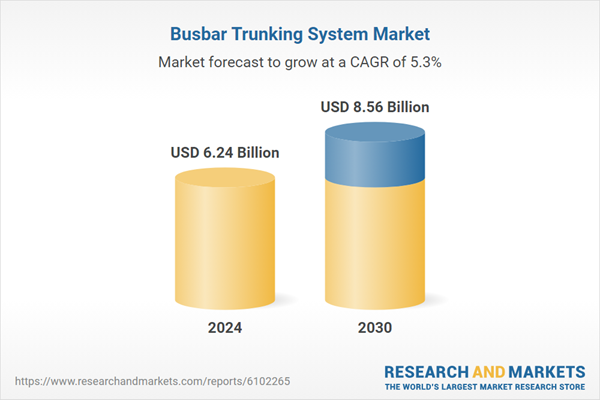Speak directly to the analyst to clarify any post sales queries you may have.
10% Free customizationThis report comes with 10% free customization, enabling you to add data that meets your specific business needs.
Busbar trunking systems are particularly suited for environments with high power requirements or frequently changing electrical layouts. The market is gaining momentum as urban infrastructure upgrades, industrial automation, and smart building developments increase globally. In addition, these systems support modern electrical demands such as integration with renewable energy and EV charging networks. Government policies promoting energy conservation and stringent fire safety regulations are further accelerating adoption.
Key Market Drivers
Accelerated Global Infrastructure Development and Urbanization Demands Robust and Scalable Power Distribution Systems
The rapid development of infrastructure worldwide, particularly across urban and industrial sectors, is a key factor driving the Busbar Trunking System market. As urban centers expand and construction activity surges, there is a heightened need for compact, reliable, and energy-efficient power distribution solutions. Busbar trunking systems fulfill this demand by offering minimal voltage drop, reduced heat generation, and lower electromagnetic interference, making them ideal for high-load environments like airports, shopping malls, data centers, and hospitals.Their modular design and plug-and-play configuration also support flexibility and scalability, allowing for efficient modifications in evolving infrastructure. Increasing investment in smart cities and sustainable urban growth, especially in emerging markets, is accelerating the shift toward these systems. The demand is further amplified by modern safety standards and regulations that mandate advanced electrical setups. With projected global infrastructure investments reaching USD 94 trillion by 2040, busbar trunking systems are expected to capture a substantial share of the segment dedicated to electrical distribution, especially in Asia and developing markets.
Key Market Challenges
High Initial Investment and Cost Sensitivity
A primary barrier to growth in the Busbar Trunking System market is the high initial investment involved in purchasing and installing these systems. The cost of high-grade materials such as copper and aluminum, combined with the need for customized engineering and specialized installation labor, drives up the upfront expenditure. This challenge is particularly significant for small and medium-sized enterprises and in cost-sensitive regions, where traditional cabling is still preferred due to lower initial costs. The total cost of ownership, including maintenance and periodic upgrades, adds to the financial burden, making busbar systems less attractive to budget-constrained industries. Market penetration is further hindered by economic volatility and fluctuating metal prices, which affect production costs. Although manufacturers are exploring modular designs and financing options to reduce the price impact, high capital requirements remain a limiting factor, especially in emerging economies with limited infrastructure budgets.Key Market Trends
Shift Toward Modular and Plug-and-Play Busbar Trunking Systems
A major trend influencing the market is the growing adoption of modular and plug-and-play busbar trunking systems. These systems are designed for quick assembly, reconfiguration, and scaling, offering a flexible solution for industries that require efficient power distribution with minimal disruption. The modular design supports various power ratings and configurations, enabling rapid deployment and customization, particularly in dynamic environments like data centers and manufacturing facilities. This approach significantly reduces installation time and labor costs, while also minimizing the risk of errors. The trend aligns with broader sustainability goals, as modular systems help cut down on material waste and simplify upgrades. Manufacturers are focusing on developing standardized, interoperable components to expand their market appeal. This trend is gaining momentum in both developing regions, where industrialization is rapid, and in developed markets where aging infrastructure is being upgraded to meet modern energy efficiency standards.Key Market Players
- ABB Ltd.
- Siemens AG
- Schneider Electric SE
- Eaton Corporation plc
- Legrand S.A.
- General Electric Company
- Mitsubishi Electric Corporation
- Larsen & Toubro Limited
- Godrej & Boyce Manufacturing Co. Ltd
- DBTS Industries SDN BHD
Report Scope:
In this report, the Global Busbar Trunking System Market has been segmented into the following categories, in addition to the industry trends which have also been detailed below:Busbar Trunking System Market, By Conductor Material:
- Copper
- Aluminum
Busbar Trunking System Market, By Power Rating:
- Low Power (Below 630 A)
- Medium Power (630 A - 2500 A)
- High Power (Above 2500 A)
Busbar Trunking System Market, By End-Use Industry:
- Commercial
- Industrial
- Utilities
- Data Centers
- Residential
- Transportation Infrastructure
Busbar Trunking System Market, By Region:
- North America
- United States
- Canada
- Mexico
- Europe
- Germany
- France
- United Kingdom
- Italy
- Spain
- South America
- Brazil
- Argentina
- Colombia
- Asia-Pacific
- China
- India
- Japan
- South Korea
- Australia
- Middle East & Africa
- Saudi Arabia
- UAE
- South Africa
Competitive Landscape
Company Profiles: Detailed analysis of the major companies present in the Global Busbar Trunking System Market.Available Customizations:
With the given market data, the publisher offers customizations according to a company's specific needs. The following customization options are available for the report.Company Information
- Detailed analysis and profiling of additional market players (up to five).
This product will be delivered within 1-3 business days.
Table of Contents
Companies Mentioned
- ABB Ltd.
- Siemens AG
- Schneider Electric SE
- Eaton Corporation plc
- Legrand S.A.
- General Electric Company
- Mitsubishi Electric Corporation
- Larsen & Toubro Limited
- Godrej & Boyce Manufacturing Co. Ltd
- DBTS Industries SDN BHD
Table Information
| Report Attribute | Details |
|---|---|
| No. of Pages | 185 |
| Published | June 2025 |
| Forecast Period | 2024 - 2030 |
| Estimated Market Value ( USD | $ 6.24 Billion |
| Forecasted Market Value ( USD | $ 8.56 Billion |
| Compound Annual Growth Rate | 5.2% |
| Regions Covered | Global |
| No. of Companies Mentioned | 10 |









